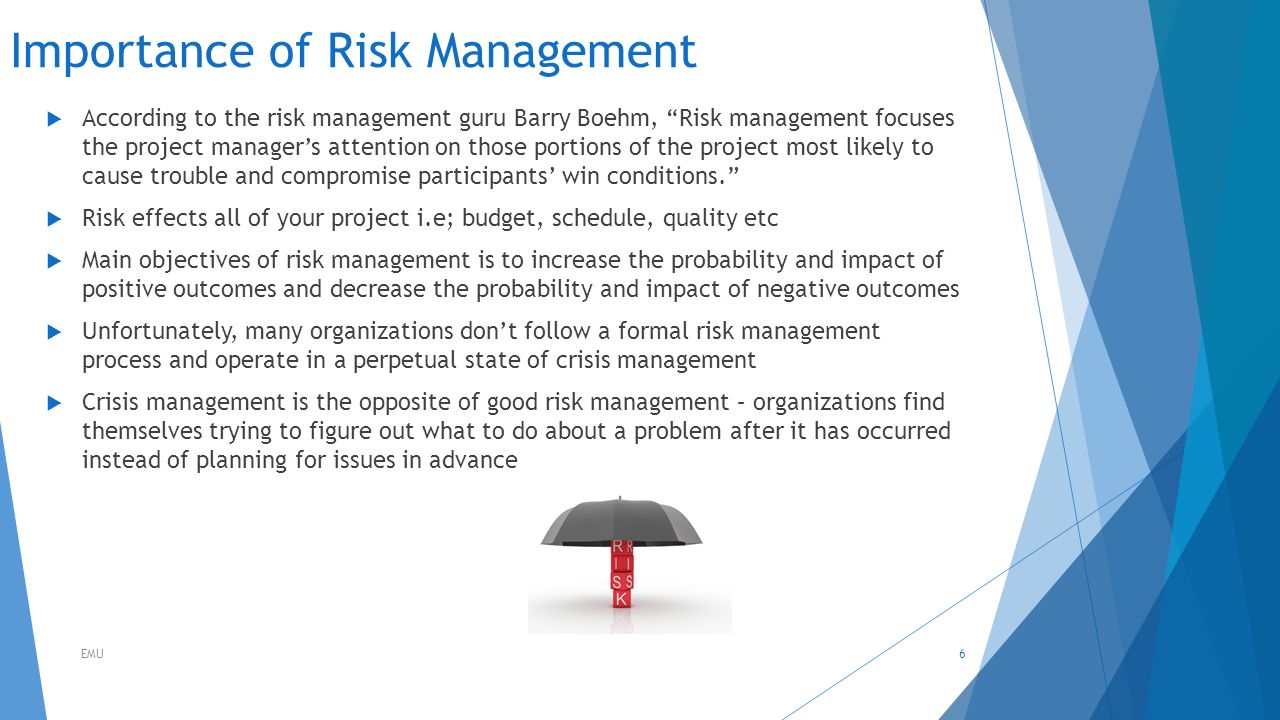Exploring the Long-Term Benefits and Importance of Risk Management for Startups
Exploring the Long-Term Benefits and Importance of Risk Management for Startups
Blog Article
The Importance of Recognizing the Relevance of Risk Management in Various Industries

The Core Idea of Risk Management and Its Objective
Risk Management, the foundation of lots of sectors, depends upon the recognition, evaluation, and reduction of uncertainties in an organization setting. It is an essential method that permits organizations to protect their assets, reputation, and general survival. By properly identifying possible risks, companies can develop approaches to either protect against these risks from taking place or reduce their influence. The analysis procedure involves assessing the possibility and potential seriousness of these risks. The mitigation process includes developing techniques to reduce their potential impact once threats have been recognized and assessed. This process is intermittent and recurring, making certain that companies are gotten ready for the ever-changing nature of Risk in various markets. The primary purpose, therefore, is to promote durability in the middle of unpredictabilities.
Benefits of Applying Risk Management in Business Operations

Unveiling the Duty of Risk Management in Different Industries
While every industry faces its one-of-a-kind collection of risks, the implementation of Risk Management approaches stays a typical denominator in their quest of sustainability and growth. In the health care field, Risk Management involves making sure individual safety and information protection, while in financing, it involves mitigating investment threats and guaranteeing regulative conformity (importance of risk management). Construction business concentrate on employee safety, job hold-ups, and budget plan overruns. In the innovation sector, firms alleviate cybersecurity risks and modern technology obsolescence. Eventually, the duty of Risk Management throughout sectors is to recognize, assess, and reduce dangers. It is a vital component of strategic planning, enabling organizations to safeguard their possessions, make the most of chances, and accomplish their goals.
Real-life Study Demonstrating Effective Risk Management
To recognize the significance of Risk Management in these numerous markets, one can look to several real-life circumstances that illustrate the effective application of these measures. Toyota, upload the 2011 quake in Japan, modified its supply chain Management to minimize interruption threats. These cases show just how sectors, discovering from dilemmas, effectively applied Get the facts Risk Management strategies to lower future risks.
Future Trends and Growths in Risk Management Approaches
Cybersecurity, once a peripheral issue, has actually catapulted to the center of Risk Management, with techniques concentrating on avoidance, feedback, and detection. The integration of ESG (Environmental, Social, Administration) variables right into Risk Management is one more expanding trend, mirroring the boosting recognition of the role that social and environmental risks play in business sustainability. Therefore, the future of Risk Management lies in the combination of sophisticated innovation, ingenious strategies, and a holistic method.
Final thought
Finally, comprehending the significance of Risk Management throughout a spectrum of markets is essential for their longevity and prosperity. Tailored methods can aid alleviate possible threats, safeguard assets, and foster stakeholder trust fund. Additionally, proactive decision-making aids in regulative conformity and optimizes source use. Eventually, successful Risk Management adds to more durable and sustainable businesses, highlighting the value of this technique in today's dynamic and very affordable organization atmosphere.
While every sector faces its unique set of risks, the application my site of Risk Management techniques stays a common in their search of sustainability and growth. In the medical care field, Risk Management entails ensuring client safety and information defense, while in finance, it involves mitigating investment risks and ensuring regulatory compliance. Ultimately, the function of Risk Management across markets is to determine, evaluate, and reduce threats. These situations demonstrate exactly how markets, discovering from crises, efficiently go to these guys used Risk Management approaches to decrease future risks.
Report this page